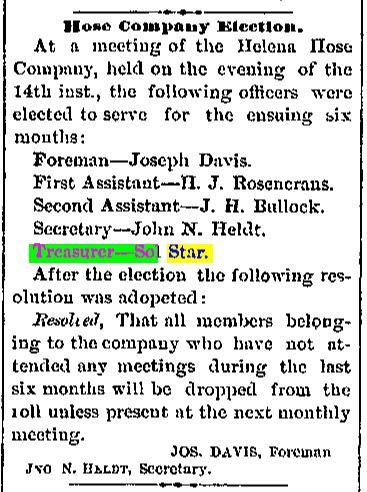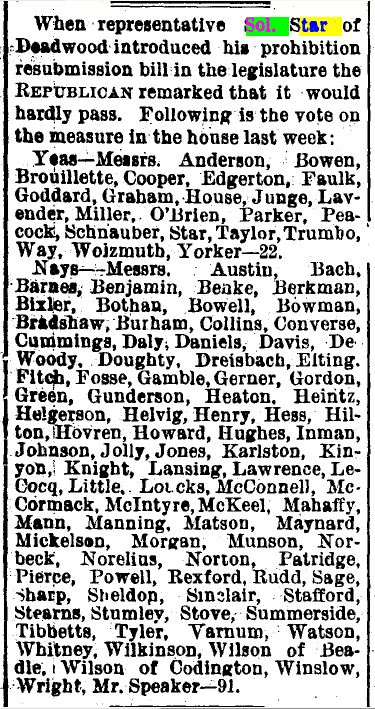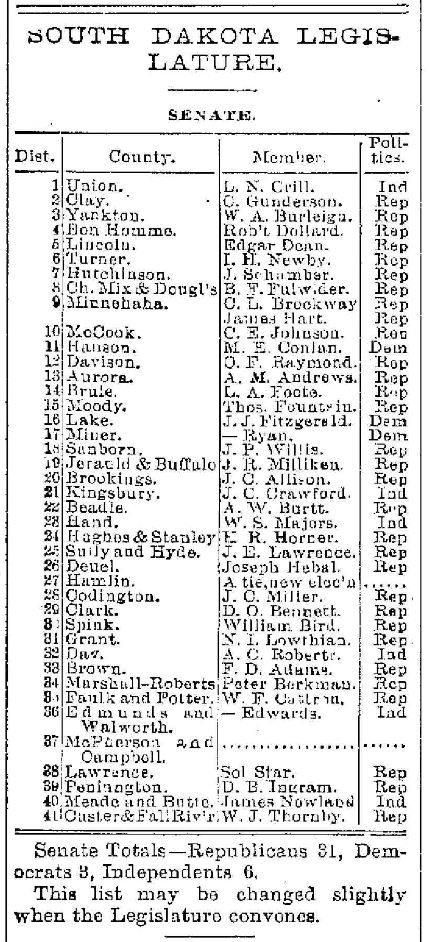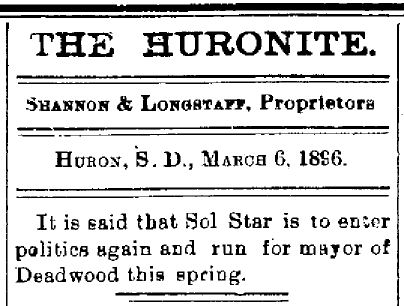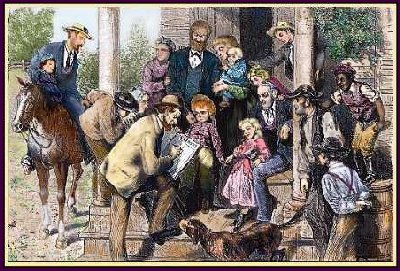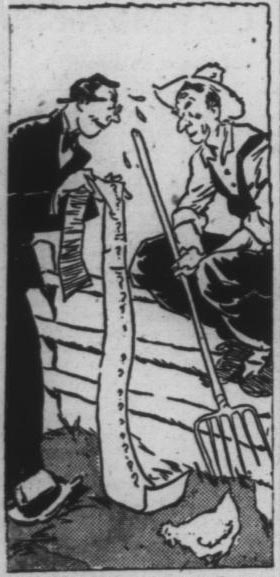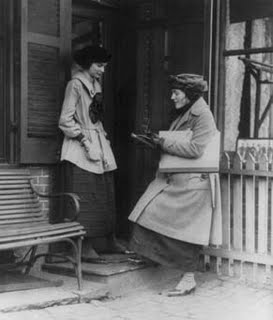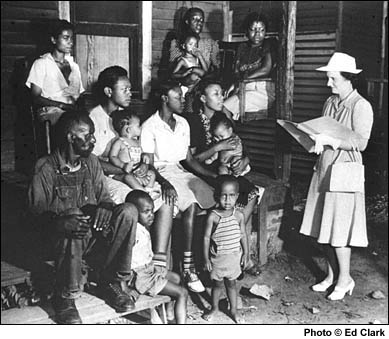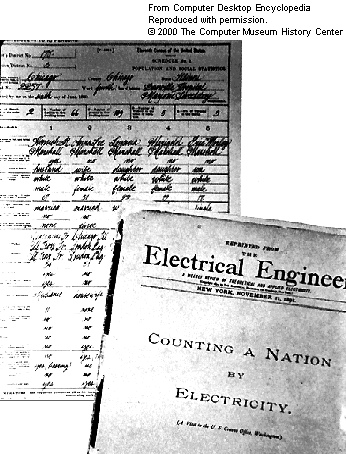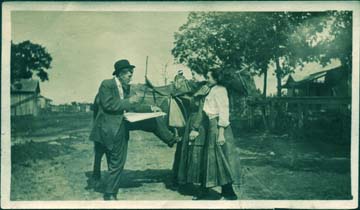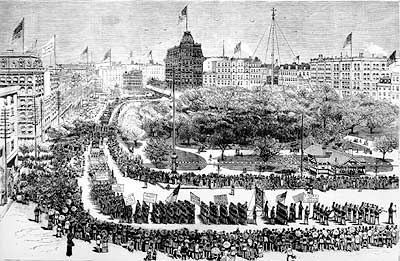
FROM THE BLACK HILLS.
A Newsy Letter from Seth Bullock.
Through the courtesy of Mr. Chas. Warren we are permitted to use the following letter from the well known ex-Sheriff of Lewis and Clark county:
DEADWOOD, Sept. 8, 1876.
“I arrived here August 3d, and found a “red hot” mining town, situated at a point where Deadwood empties into Whitewood. The gulches are very rich; claims are all taken, and sold at high figures. Deadwood is the best gulch so far as known. Claims are 300 feet up and down, and extend from hill top across — about as large as a ranch. The country is overdone, or rather men have come here too fast for the amount of work that can be done in one summer. A great many are here idle and broke. The Indians will not permit a man to go out side of the gulch, so that very little prospecting can be done.
Crowds arrive and leave daily. Most all the travel is by way of Cheyenne. Fare all the way from ten to thirty-five dollars; time from five to thirty days. Business of all kinds are represented. Langrishe has a theatre here, and two dance houses boom nightly. We have no law and no order, and no prospect of either. Several murders have been committed and nothing done. A night herd romes the streets at night, and whoop and shoot until morning.
Nebraska farmers peddle flour, bacon and groceries from claim to claim, which makes the grocery trade dull.
Dennee is here. “Sid Osborne” left for Montana a few days ago on biz. The country is full of Montanians. Ches. Trais arrived to-day and 106 others. Tell your friends not to come here this fall, that is, those who come to work or prospect. I cannot advise you to come; on the contrary I think you are doing better than you could here. Board here is $10 per week, flour $8 per hundred, bacon 20 cents per pound, etc., whisky 25 cents a drink. The Hills are too near the “genial influnces” for times to be here as they were in Montana in ’49 without other diggings are found. Two years will take the cream of this country. I don’t believe it is any better for farming than Montana. We have a little more rain here, and as many grasshoppers. Sol Star is here and doing fair. I am satisfied to remain for a while. I shall go east this winter if you do. We have no regular mail. A coach is expected here daily. Let me hear from you with the Montana news.
Your friend,
SETH BULLOCK.
Butte Miner (Butte, Montana) Oct 3, 1876

Seth Bullock Has Him In Charge.
DEADWOOD, August 26. Three road agents who have been plying their vocation on the Cheyenne stage route were arrested and jailed here this evening. They came into town yesterday morning and were spotted by the Sheriff and his deputies. The arrests were made this evening. One of the robbers resisted arrest, drawing a revolver and shooting Officer May through the arm, The fire was returned, but the desperado succeeded in getting to his horse and started over the hills. The horse was killed by a rifle shot, and before the robber could recover himself from the fall Sheriff Bullock closed with and easily overcame him, as he had been shot through the body and was weak from loss of blood. The wound is probably fatal.
The Helena Independent (Helena, Montana) Aug 28, 1877

In the contest for the office of Sheriff of the Black Hills, between Seth Bullock and John Manning, both old Montanians, the latter was victorious. The entire Democratic ticket was elected by handsome majorities. Doc Carter ran on the People’s ticket for County Recorder and got left out in the cold.
The Helena Independent (Helena, Montana) Nov 21, 1877

Seth Bullock, Capt. Hazerodt and J.F. Mckenna are the Republican, and John Manning, Jeff McDermott and W.H. Stittwell the Democratic aspirants for the office of Sheriff in Lawrence county, Dakota.
The Helena Independent (Helena, Montana) Oct 1, 1878

Montanians Seeking Office.
The Black Hills people appear to take a good deal of stock in Montanians, as they nominate them for all the important offices. Those who were formerly residents of Helena and candidates on the Democratic ticket, are: John Manning, for Sheriff; Geo. Felix Ingram for Assessor, and Frank Abt for County Commissioner. The Republicans have nominated Seth Bullock for Sheriff and James Carney for Treasurer.
The Helena Independent (Helena, Montana) Nov 2, 1878

Seth Bullock, an old-time sheriff of Lewis and Clarke county, arrived in the city last Sunday from the Black Hills, where he is extensively engaged in business. He received a perfect ovation from his many friends here.
The Helena Independent (Helena, Montana) May 23, 1882

Deadwood Dotlets.
Special to the Globe.
DEADWOOD, Dak., June 6. — It was announced yesterday that the Fremont, Elkhorn & Missouri Valley railroad, the track of which is now laid within fifty miles of Rapid City, would build north and west to a point near Fort Meade this summer. This will bring the railroad within fifteen miles of Deadwood…
The Electric Light company will start up this evening, after two weeks idleness. The company had been reorganized and the works will be moved from the present location on Sherman street to Upper Main street …
Judge Church of the district court on Monday denied an injunction to F.W. Hamilton et al. against Seth Bullock and others who are in possession of the Hattenbach smelter and water right at the carbonate camp. The decision was received with general rejoicing here as it was feared that had the decision been otherwise work would be stopped on the Iron Hill for some years, as the Hattenbach water right affords the only water at present available for working the Iron Hill mill…
The annual meeting of the Iron Hill stockholders was held in this city yesterday, who re-elected the old board of directors. A monthly dividend of 5 cents per share was declared….
The grand lodge of Knights of Pythias will meet at Rapid City on the 15th inst. The knights of the hills are determined to make this session of the grand lodge a memorable one, and large delegation will attend from Deadwood, Central City and Lead City.
St. Paul Globe (St. Paul, Minnesota) Jun 7, 1886

A new faction is to appear in the Watertown convention from the Black Hills, designated as the Bullwumps. It will appear as a contesting force, nominally for SETH BULLOCK, but ready to trade with any faction that will give them a show for seats. The name is, of course, derived from that of the leader. There are two or three other lots of contestants that will tend to enliven matters at Watertown.
St. Paul Daily Globe (St. Paul, Minnesota) Aug 18, 1888

DEADWOOD NIPPINGS.
Judge Palmer Was Wired as the Proxy of the Hills at Huron.
DEADWOOD, Dak., Jan. 18. — “We, the people of Lawrence county,” met at the city hall Tuesday afternoon the 13th, and elected twenty-two delegates to attend the Huron convention. An obscure call appeared in the morning papers of the same morning, and before those papers appeared in the outside precincts, the “mass” convention had met, resoluted and adjourned. It is well said that Dakota holds more conventions than any other state in the Unions, but in Lawrence county they can call and hold a mass meeting of the citizens of the county in less time than it takes to tell. The one held on the 15th was remarkable in that it was conceived, called, held and over with in less than ten hours, and the county is larger than the state of Rhode Island. The total number present at this “we, the people” was five, consisting of Messrs. G.G. Bennett, Seth Bullock, Samuel Cushman, Ploughman and Church. Several newspaper representatives were also present.
Twenty-two delegates were chosen, comprising what is known as the Mugwump element of the county and a few others, and the proxies of the entire delegation were telegraphed to Judge Palmer.
Resolutions were also telegraphed favoring division and admission and a new constitutional convention for South Dakota, and strongly urging a new election of officers.
St. Paul Daily Globe (St. Paul, Minnesota) Jan 19, 1889

ENERGY’S LIBERAL REWARD
The Gates of Mineral Edens Yield to Hard, Persistent Knocks.
A SKETCH OF ENTERPRISE IN THE BLACK HILL
[Excerpt]
The Black Hills.
DEADWOOD, S.D., Aug. 27. — Correspondence of THE BEE. — The Bald mountain and Ruby Basin mining districts of the Black Hills which are just now attracting more attention perhaps, than any other gold and silver mining districts in the United States, lay some eight miles north of Deadwood, in Laurence county. The districts are some four miles long by three miles wide and are remarkable for the great number of deposits of pay ore that have been brought into sight by a minimum amount of development. The ore which is silicious, occurs in blanket veins, from three to twenty-five feet thick, and from ten to eight feet wide, as in the Golden Reward, and ranges in value from $18 per ton upwards into the hundreds. The general average being about $30….
With a courage and determination admirable, when the many difficulties standing in the way, and the long line of misfortunes by which all previous efforts had been met, are contemplated Mr. Franklin and the gentlemen associated with him, refused to abandon the purpose they had in view, and lost no time in looking about for some other process. The Newberry-Vautin chlorination method was just then attracting attention in the United States, as well as in Australia. The company had a small plant in Denver, and thereto Messrs. Franklin, Bullock and C.W. Carpenter went.
Several weeks were spent studying the process, the gentlemen returning to Deadwood satisfied that while as operated at Denver it was not practical for Black Hills ores, it was susceptible to change and modifications, which would excellently adapt it to the peculiarities of the Hills. So many failures had characterized the effort to treat these ores that when approached for subscriptions toward building another plant, a majority refused having anything to do with the project. The burden, therefore, fell on some eight or ten, most prominent among them being Harris Franklin, his business partner Ben Baer, Seth Bullock, Colonel C.W. Carpenter and George C. Hickok.
These gentlemen organized a corporation under the name of “Golden Reward Chlorination works,” and at once began building a plant. Warned by other failures they started on a small scale, the works at first having a capacity of only thirty tons per day. The first run was not a brilliant success. Nothing daunted the gentlemen continued putting money in, and some seven or eight months later were able to positively announce that the difficulty has at length been solved, that the chlorination process, as operated by them, was an absolute success in saving every cent of gold contained in the ore, and that the operation of Bald Mountain and Ruby Basin mines to a profit was not only possible, but probable and practicable.
The next four months’ operations of the plant proved conclusively all they had claimed for it. Capacity was doubled and the plant has been kept continually busy on ore from the Golden Reward mine, turning out bullion at the rate of $30,000 to $33,000 per month. It is not claimed for this process, however, that it will save any silver the ore may contain, and as a good many of the silicious deposits referred to carry silver in value ranging from $8 ot $30 per ton (Golden Reward ore carried from $1 to $3 silver only), in addition to the gold, it became necessary to devise a method for saving the silver.
At the Golden Reward plant the cost of treatment is something under $5 per ton for gold alone, and experiments made proved that by adding vats and resort to lixiviation the silver could be saved for an additional cost of $2 per ton. The ore of this particular mine carries so little silver, however, that it has not been deemed advisable to put in the additional machinery necessary to save it.
About the time Mr. Franklin and associates completed this chlorination plant, Dr. Franklin R. Carpenter, then dean of the Dakota school of mines, who had given close study to Ruby Basin and Bald Mountain ores, and who had some months previously published an article in the Rapid Republican, advocating their treatment by pyritic smelting, made a series of successful experiments with the process at the school of mines laboratory. At some of these experiments Seth Bullock, then president of the Iron Hill mining company, and the late J.K.P. Miller, of Deadwood, were present. The gentlemen were both convinced that the process was an absolute success, and returned with that idea firmly fixed in their minds. Mr. Bullock shortly afterward determined on a practical test at the Iron Hill. The result is concisely told in the following clipping from the Black Hills Times of January 1, 1890.
“The first practical test of the pyrite scheme was made by Seth Bullock at the Iron Hill, when the basic ores of the mine were mixed with the dry gold-silver ores of Ruby Basin and pyrite from Galena, also carrying a little gold and silver, thus modifying but very slightly the process as usually practiced. The process was a gratifying success as demonstrated by the treatment of over 400 tons of ore. Two runs were made — thorough test of eight days continuance, the only change necessary to the smelter being the filling of the lead well. The proportions of a charge cannot be stated more definitely than that from fifteen to twenty per cent of pyrites is an ingredient with Iron Hill and Ruby ores and lime, effecting a concentration of ten tons into one and giving an absolute clean slug.”…
Omaha Daily Bee (Omaha, Nebraska) Aug 30, 1891

Seth Bullock of Deadwood will write a book entitled, “Twenty Years in the Territories.” Its subject matter will touch on the doings of vigilants of Montana, the horse thieves of Nebraska and the stage robbers of the Black Hills.
Omaha Daily Bee (Omaha, Nebraska) Jul 10, 1893

HERE IN UP-TO-DATE GUISE
FRONTIERSMAN SETH BULLOCK VISITS ST. PAUL
Was One of the Civilizers of Montana and the Black Hills Region — As the First Sheriff of the Black Hills He Put to Death Many of the Desperadoes of the Frontier.
Seth Bullock, a frontiersman, who assisted in the civilization of Montana and the Black Hills region, by sending innumerable desperadoes over the great divide via the pistol route and the hangman’s noose, is visiting the Twin Cities in the thoroughly up-to-date guise of a promoter for the Belle Fourche Smelting and Refining company, of the Black Hills.
Mr. Bullock formerly owned the land being worked by the Belle Fourche company, and now that his former occupation of sheriff, vigilante and Indian fighter is gone, he is engaged in furthering the mining interests of the section where he passed through so many dangers and thrilling experiences.
As the first sheriff of the Black Hills, Seth Bullock was a peace officer feared by the desperadoes of the hills. His determination to do his duty, coupled with indomitable courage, led him to relentlessly pursue evil doers, and when the “bad” men found Bullock on their tracks they knew justice would be meted out to them.
While never taking life needlessly, Seth Bullock says he has been forced to kill so many tough characters that he has lost actual count of the notches on the butts of his “shooting irons.”
Sometimes, when accompanying a valuable consignment of bullion overland, Mr. Bullock was obliged to distribute the contents of his Winchester rifle among half a dozen bandits who attempted to hold up the stage. The stage seldom stopped to get a list of the dead and wounded from the robbers, so Mr. Bullock does not know just how many he killed in these “sorties.” On one occasion, however, while the stage which he was carrying through traveled a small canyon sixty miles from Deadwood, four knights of the road undertook to appropriate the treasure aboard, but a series of rapid shots from Bullock’s rifle eliminated all danger and annihilated the robbers.
Mr. Bullock made his reputation as chairman of the 3-7-77 vigilance committee, of Helena, Mont., before he went into the Black Hills. There was a great deal of work for the vigilantes in those days, and very frequently the figures 3-7-77, meaning a meeting of the committee was to be held that night, could be seen chalked about the street.
In the secret conclaves Bullock presided over the deliberations of men as sternly bent on exterminating lawlessness as himself, and when it was decided that any particularly tough character was due, he was soon captured. The vigilance committee did not execute the criminals, but turned them over to the courts.
In 1872 Bullock was elected sheriff and during four years of service hung many criminals. He was quite a monopolist as regarded the hanging function as was indicated on one occasion when lynch law was about to be invoked in the case of two men arrested for train robbing.
The vigilantes wanted to string the prisoners up without ceremony. Seth reckoned as how he would attend to the hanging himself and proceeded to execute the robbers.
“You are a d–m monopolist,” said one of the vigilantes, “you want to do all of the hanging yourself.”
Mr. Bullock was a personal friend of Buffalo Bill and Wild Bill, with whom he was at times closely associated. Seth liked Wild Bill, and though McCall killed many men, Seth thinks he was justified in many cases.
When the gold discoveries were made in the Black Hill Seth Bullock and a party of friends went with the rush to this section. It was a lawless country, where murders and robbery were the order of the day. Outlawry became so rampant that Bullock was prevailed upon to accept the office of sheriff in the hills as he had done in Helena. His election gave the Black Hills country its first sheriff, and as such Bullock’s name struck terror to the hearts of evil doers.
It was here that he did most of his Indian fighting. The troublesome Sioux of Sitting Bull made border life extremely dangerous, and when the general uprising, which resulted in the terrible Custer massacre, threatened the extermination of white settlers, it was Seth Bullock who offered to put down the red skins. Bullock had been appointed adjutant general of the territory and wired Gov. Pennington the following message:
“The Indians are still massacreing our people in Spear Fish and Belle Fourche valleys. I advise that you permit me to take my troops down and kill the agents at Pine Ridge, Cheyenne and Standing Rock. This will stop the Indian trouble.”
Gov. Pennington telegraphed in reply: “Better wait awhile, Seth.”
Mr. Bullock says his plan was somewhat unusual, but declares it was a solution of the problem, as he charges the Indian agents with the responsibility of the uprisings.
In appearance Seth Bullock is the typical frontiersman, with one exception. He has never worn his hair long, as is characteristic of most Western notables. Fully six feet tall, straight as an arrow, with a muscular figure and aquiline features, he appears a splendid type of physical manhood. His blue-gray eyes are a noticeable feature.
Sparkling with subdued fire, they are kindly in expression, but bespeak the “flinty” look of the yellowback novel, should the owner become aroused.
Since it has become safe to live in the Black Hills, Mr. Bullock has undertaken the development of rich gold property which came into his possession. Several Twin city capitalists are associated with him in business. Mr. Bullock declares the Black Hills district is the richest gold producing country in the world. Last year the output, he says, was $10,000,000, and that of the year before $8,000,000, and all of this wealth, Mr. Bullock says, came from a district within a ten-mile radius of Deadwood.
The mining in this section is all quartz mining, Mr. Bullock says, and the claims owned by large companies, who operate huge smelters for extracting the precious yellow metal, the largest smelter in the world, he says, being at Deadwood. Mr. Bullock says few people realize the richness of the Black Hills gold region.
The Saint Paul Globe (St. Paul, Minnesota) Mar 25, 1898

Enlisting Rough Riders.
DEADWOOD, S.D., May 4. — (Special Telegram.) — The appointment of Seth Bullock as a captain in the regiment of cavalry which Attorney General Grigsby has been authorized to raise has created much enthusiasm in this and other adjoining counties of the Black Hills. As soon as his appointment was telegraphed him Mr. Bullock sent runners to every cow camp in the Black Hills and has now enrolled in his command over 400 of the best shots and most fearless riders in the world, all of whom are ready for service in Cuba or the Philippines.
Omaha Daily Bee (Omaha, Nebraska) May 5, 1898

Grigsby’s Rough Riders.
The daily reports of the surgeons show that the health of the camp is improving.
The Rough Riders were mustered in yesterday morning and will probably receive their pay today. Several of the officers left camp to obtain signatures of those who are sick, so they can draw their pay.
The troop commanded by Captain Bullock has been pronounced the healthiest body of men in the regiment….
The camp of Colonel Grigsby’s cowboys was moved yesterday from the location where they have been camped since their arrival at the park, to the Brotherton field, east of the First Illinois cavalry. Lieutenant Colonel Lloyd, who is in command of the cowboys, is well pleased with the new location and thinks the change will prove beneficial to the health of the regiment….
A general court-martial has been appointed and ordered to be convened at the brigade headquarters by Assistant Adjutant General William E. Almy. The following are the members of the court-martial: Major L.H. French of the cowboys and Major Frank B. Alsip of the First Illinois cavalry and Captains Seth Bullock, J.B. Binder, C.E. Gregory and J.T. Brown of the cowboy regiment…A large number of cases will be tried by the court.
Omaha Daily Bee (Omaha, Nebraska) Aug 4, 1898

Captain Bullock Convalescing.
DEADWOOD, S.D. Sept. 26. — (Special) — Captain Seth Bullock of Grigsby’s regiment had been dangerously ill in this city with malarial fever, which was contracted in Camp Thomas. He is slowly recovering.
Omaha Daily Bee (Omaha, Nebraska) Sep 27, 1898

TO THE FOREST RANGERS.
A Circular Issued by Seth Bullock, of Deadwood.
The manner in which the great timber preserves of the Northwest are protected against fires and the ravages of outlaw timber cutters is illustrated in a circular letter just issued by Seth Bullock, of Deadwood, S.D., one of the most energetic forest supervisors in the country. Mr. Bullock was sheriff in Deadwood when that town was infested by the most lawless element of the West. His decisive actions resulted in the establishment of law and order. Under his regime ugly characters learned to give Deadwood a wide berth.
President Roosevelt, while operating a ranch at Medora, was one of Mr. Bullock’s deputies. The circular issued by Mr. Bullock is addressed to the Forest Rangers, and is as follows:
“To Forest Rangers, Black Hill Forest Reserve.
“Sirs: Your attention is called to the fact that in a number of instances the monthly reports of the forest rangers of this Reserve show but a few miles traveled per day while patrolling their districts. From two to ten miles frequently appears as all that is accomplished, no other work being undertaken or reported as having been performed.
“You are advised that a forest ranger is supposed to patrol his district on horseback, and that the patrolling of districts on foot will not be permitted. A few monthly reports — very few, I am glad to say — indicate that that particular ranger performs as little service as he can during the month, just enough to have his report approved and escape censure. Rangers of this class must not be disappointed if they are furloughed this fall, and an additional leave of absence granted them next summer. Shiftless, careless work will not be tolerated in the future. An honest day’s work honestly performed is what is required and will be insisted upon.
“You are expected to thoroughly patrol your district, getting to every part of it at least once a month, familiarizing yourselves with every trail and every road upon or through it; by whom and for what purpose they are used. You should also know the name and occupation of every resident of your district temporary as well as permanent, and ascertain by what right they are upon the reserve and what their business it. An especial and vigilant watch must be kept for forest fires. Visit often the places frequented by campers as they are a prolific source of fires. Establish correspondence at various points within your district with persons residing therein who will keep you advised of forest fires and depredations, either on the forest reserve or on the public lands near by.
“See that the forest fire notices are put up and maintained upon all the public roads and trails of your district. Report all cases of fire and trespass as soon as you have knowledge of them. In all your intercourse with the public extend such treatment that every honest man within your district shall be your personal friend. Very respectfully,
“SETH BULLOCK.
“Forest Supervisor.”
The Evening Times (Washington, D.C.) Oct 12, 1901
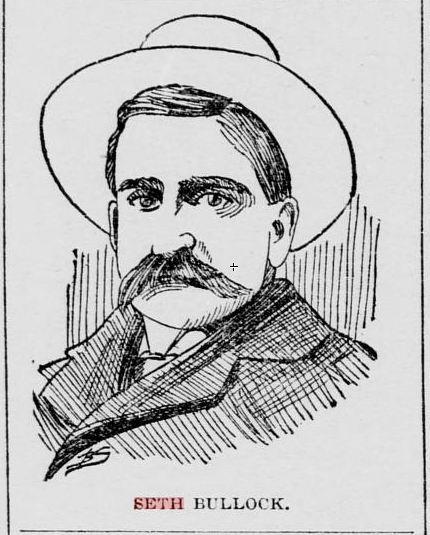
BORDER MAN IS GUEST AT WHITE HOUSE
Seth Bullock See the President Daily.
Former Sheriff of Deadwood Warmly Welcomed.
Tells of Mr. Roosevelt’s Career in the Black Hills Country.
Special Dispatch to the Call.
CALL BUREAU, 1406 G STREET. N.W. WASHINGTON, Feb. 28. —
“Have you met Seth Bullock yet?” asked President Roosevelt of a caller to-day. “He comes from Deadwood and is about as fine a type of the real man as you will find in the Western country. He used to be a neighbor of mine.”
Seth Bullock of Deadwood, formerly a Black Hills Sheriff, has been a guest at the White House several times during the last week at luncheons and once or twice at dinner.
He has had a horseback rid or two with the President and last Thursday, mounted on one of the best horses in the White House stables, he and little “Archie” Roosevelt, mounted on his spotted pony, took a long ride over the country roads of Maryland.
Mr. Bullock, or “Captain” Bullock, as he is called, is supervisor of the national forest reserve in the Black Hills, which comprises a stretch of woodland 100 miles long and fifty wide. He is the commanding officer of twenty or thirty forest rangers.
This friend of the President is as straight as one of the pines in his native State of Michigan. He is six feet tall and as spare as a trained runner. He has the eagle nose of the fighter and eagle eye of a man who does not know what it is to flinch. He has a sandy moustache and a full head of hair that has dodged the Indian scalping knife a half dozen times. He was a born adventurer, because when 14 years of age he followed his five older brothers into the army and enlisted as a drummer boy.
“I have known the President for a good many years. I knew him first when he took up his ranch on the Little Missouri,” said he to-day. “It didn’t take the neighbors of Mr. Roosevelt very long to find out that, although he was from the East and a bit near-sighted, he was just as able to take care of himself as any of us who had been out there since the first stampede to the Black Hills, and he was ready to do his part, too. When cattle thieves came out of the Black Hole, he took his share of work in bringing them to justice, and when he had to be made a deputy Sheriff and was asked to go after a couple of desperadoes down in the river bottom he always went and he always brought them back.”
The San Francisco Call ( San Francisco, California) Mar 1, 1903

LOVELY SPURS FOR ARCHIE ROOSEVELT
President’s Son Gets Keepsake From Capt. Seth Bullock.
DEADWOOD, S.D., June 9. — Capt. Seth Bullock, of Deadwood, has ordered as a present for Archie Roosevelt, third son of the president, a handsome pair of cowboy spurs, made on a special order. They were procured for Capt. Bullock by Edward McDonald, mayor of Deadwood, who is a saddler. They are hand made and represent the highest skill of forging and finishing.
They are of the regulation cowboy type with drop shank, large rowells and locks with wide hand-stamped Russia leather and gold conchas. The spurs are silver mounted and chased with an artistic design. The boy for whom they are intended rode much with Capt. Bullock when the latter was in Washington.
The Saint Paul Globe (St. Paul, Minnesota) Jun 10, 1903

SETH BULLOCK IN WASHINGTON
ROOSEVELT’S OLD BAD LANDS FRIEND LUNCHES WITH HIM.
Doesn’t Like to Talk About the Days When He Was a Terror to Evildoers in Deadwood — More Interested in Forestry — Punctures the Calamity Jane Myth.
WASHINGTON, April 9. — Seth Bullock is making his annual visit to Washington. It is the same Seth Bullock, who, as the first Sheriff of Deadwood, was a terror to law breakers all over the Black Hills region and officiated at some half a dozen more or less impromptu executions of horse thieves and bad men. But in one way he has changed.
To his old comrade and friend, Theodore Roosevelt, and to his other companions of the old days on the Little Missouri, he is the same always. But to strangers who would fain converse about the dime novel exploits of his comrades and himself on the frontier he is simply a plain American citizen, quietly plodding paths of peace, and a little surprised, and even grieved, when the conversation is turned to such subjects as the early days of Deadwood and the exploits of Corral Charlie and Calamity Jane.
And so it happens that the conversation soon reverts to the affairs of the Black Hills Forest Reserve, of which Mr. Bullock is the Federal superintendent, and to the glories of President Roosevelt’s Administration and to Roosevelt’s peerless virtues as a gentleman and a scholar. Not even Jacob Riis is a more ardent admirer of Mr. Roosevelt than is Seth Bullock.
He knew Roosevelt when Roosevelt was a plainsman, and it is his proud assertion that his old friend of the Bad Lands hasn’t changed a bit since he was elevated to the highest place in the nation. He took luncheon with the President at the White House the other day, and they swapped stories of the old days, and seriously discussed affairs of State and of the Black Hills Forest Reserve.
Last year he was the President’s guest at the White House, and he attended some of the largest of the State entertainments. He is quite at home in polite society, and except as a man of muscular build and the possessor of a rather fierce looking, melodrama villain’s mustache, would not attract special notice from casual observers.
To some intimates he did remark that the Marine Band played fine music, but that it was pretty far up the gulch for him; and he wished they would play “There’ll Be A Hot Time” and a few similar pieces more to his liking.
Bullock’s saddle gait and his sun tanned skin give him the look of a plainsman, or at least of a man accustomed to a vigorous outdoor life. The only article of apparel that suggests his habitat is a sombrero of the Montana peak variety, but he remarked to a friend who admired his that:
“Why, I’ve seen more hats almost like this in Washington to-day than you’d see in Deadwood in a week.”
To a reporter who called on him Mr. Bullock said smilingly that he didn’t propose to talk about Deadwood as it was, nor to discuss Calamity Jane, Corral Charlie, Arizona Ike or any other of the Western celebrities with whom he came into more or less forcible contact when he was Sheriff of Deadwood in the palmy days of the Black Hills gold excitement.
“The West, including Deadwood, is civilized now,” he said, “and I am sure there is more genuine interest in its present and future development and in the irrigation and forest reserve problems than in discussing the more or less notorious characters of the early days who have been lifted from their actual level in real life to a much higher plane in the realm of fiction.
“And I must say that I grow sorrier and sorrier every day to think that I was ever Sheriff of Deadwood. I am perfectly willing to discuss the Black Hills Forest Reserve by the hour, for it is a good work and an important work and a work in which any one might well take an interest. But I have found that when I meet a man who looks as if he wanted to ask questions and am priming myself to give him statistics of the population of Deadwood, and describe the trolley cars that run through the streets of that hustling little town, he usually begins by saying in a coaxing voice:
“‘Mr. Sheriff, is it true that you have killed forty-seven men?’
“That may appear as a joke to some people, but it is far from being one. Last year when I came to Washington and had been in town for half a day or so, I was somewhat surprised that no newspaper men came to interview me. You see, I have become rather used to the process.
“But in this case it seemed that personal interviews were not necessary, for when I read the papers the next morning I found various delightfully interesting and accurate accounts of the life of ‘The Sheriff of Deadwood,’ ‘The Conqueror of Deadwood Dick,’ ‘The Terror of South Dakota,’ ‘The Man With Sixteen Notches on His Gun Butt,’ and a lot of other things that make a man feel tired.
“The only way that I can figure it out is just that only two men I ever did send over the range — and they were worthless and deserved it — have been drawing compound interest all these years. At any rate, all that sort of thing is, to put it mildly, disagreeable. I don’t like it and my family and friends don’t like it.
“I am down here in Washington just now,” said Mr. Bullock in answer to a question, “on official business. There are some matters in connection with the forest reserve on which I wanted to consult the officials of the General Land Office.
“It is quite a change to be here in Washington, and I like it. When I am home, as Superintendent of the Black Hills Reserve I spend about half the time in the saddle, and of course it grows tiresome at times. You see, I have only fourteen men under me in the winter and between twenty-five and thirty in the summer, and it keeps us pretty busy patrolling a tract seventy miles long and forty wide, and containing about a million and a half acres of timber land.
“But our work is well repaid, for we have not had a forest fire of any size in the reservation since I became superintendent, and the timber is reproducing itself. Just as much timber is being cut as ever, but the careful supervision exercised over the tract and the cutting of timber under observation have resulted in reproduction, and if the same course is followed there will be just as much timber on the land fifty or one hundred years from now as there is as present.”
“I guess those were swift old days in Deadwood during the Black Hills excitement,” remarked the reporter reflectively.
“Oh, shucks!” said Mr. Bullock in disgust, “you’re just like all the rest. I thought I had you switched on to the forest reserve proposition, and I’ll bet you haven’t even been listening, but just waiting to spring that question.
“I don’t want to talk about those times, though I’ll admit they were strenuous; but I will say that just about as much fiction has been printed about one of the so-called famous characters of those times as there has about me. It is of a different kind, though, I trust.
“I mean Calamity Jane. Calamity Jane never was a scout and she never did any of the thousand and one wonderful things she’s been credited with doing.
“She started out once in her buckskin as a mule driver with an expedition that was going out after the Indians, but the commander discovered before very long that she was a woman and left her at Fort Laramie.
“There was a newspaper correspondent there who had started with the detachment, but got sick with mountain fever.
“Calamity Jane nursed him back to life, and he was so grateful that he gave her a reputation in fiction that she certainly never possessed in real life.
“And that’s about all of Deadwood — the old Deadwood — for today. Want to know anything more about the Black Hills Forest Reserve?”
The Sun (New York, New York) Apr 10, 1904

LIKENS CONVENTION TO FUNERAL DIRGE
Western Admirer of Roosevelt Deprecates Lack of Noise, Music and Enthusiasm.
BLAMES EASTERN DELEGATION
Seth Bullock, First Sheriff of Deadwood, Says if the President Were Present Things Would Be Run With a Whoop and a Bang.
REPUBLIC SPECIAL.
Chicago, June 21. — Seth Bullock of Deadwood, S.D. says:
“It’s too blame slow.”
Of Seth Bullock, President Roosevelt once said to the writer: “Have you seen Seth Bullock in town to-day? He is about as fine a type of man as this country produces.”
He was the first Sheriff of Deadwood, and is now Captain of the Black Hills Rangers. He can ride fast and shoot straight. He came here to see “his friend Theodore” nominated in a whirlwind of Black Hills excitement — a slap, a dash, a whoop and a bang. He is disappointed and does not hesitate to so express himself.
“Why, you New York fellows,” said he to-day, “are regular clams. We have got mosquitoes out in Deadwood that would create more enthusiasm than the entire New York delegation. Looks to me as if they were from the Jersey flats. No bands, no whooping and cheering and very little hand-clapping. Why, it’s as cold as Alaska, and I don’t like it.”
Captain Seth Bullock’s duty is to protect the forest reserve. So it happens that he is another of the Federal officeholders attending the convention. He is accustomed to seeing things done quickly and with enthusiasm.
“I must confess,” said Mr. Bullock, “that I am surprised at all this. If Mr. Roosevelt were only here himself you’d see things whooped up. We are for him out in the West good and hard. I’d like to see more noise about his nomination. We men out West are not gaited that way. Why, I saw hardly a smile on the New York delegation during the entire proceedings at the convention to-day, and when Mr. Root mentioned Mr. Roosevelt’s name at the end of his speech it was our fellows from the West who made the noise. And Mr. Roosevelt is a Republican, come from New York, and from Manhattan Island.”
“How many conventions have you attended?” was asked.
“My first was in 1880, right in this city, when Garfield was nominated. I was one of the original 306 Grant men, and I stuck to him to the finish. Grant was a sort of Roosevelt man, and we liked him out in the West for what he was and what he did. But when Garfield was finally nominated we whooped it up for the ticket just the same, because we were good Republicans.
“Why, there was more hollering in that convention in one minute than I have heard all the time since I’ve been in Chicago. That’s the way to nominate a man. Why, in those days the bands played all night. Now they don’t play in the daytime, or, if they do, it’s something like a dirge. And then I came to the convention here in 1888, which nominated ‘Ben’ Harrison. There was noise then, too, and, although General Harrison was not a man to inspire a great deal of hollering, yet we produced the goods. That’s why this convention seems so tame to me.”
“What are you Western Republicans going to do for Mr. Roosevelt in November?”
“Give him a corking big majority. Every State west of the Rockies will go for him strong, and I might say every Western State. But, all the same, I don’t like the way your New York crowd acts and I can’t understand it.”
And Mr. Bullock, Esq., wandered off to the cigar stand after more consolation.
The St. Louis Republic (St. Louis, Missouri) Jun 22, 1904

17 FEDERAL PRISONERS.
HEADED FROM SOUTH DAKOTA TO LEAVENWORTH.
IN CHARGE OF SETH BULLOCK
Horse Thieves, Bootleggers and a Counterfeiter Were Taken Through Here at Noon — Some of the Prisoners Were Bound in Chains.
It was a strange party of travelers that passed through Norfolk at noon bound from Deadwood, S.D., to Leavenworth, Kan., in a special car and chaperoned by a no less genial person than Seth Bullock, United States marshal for the district of South Dakota.
Seventeen federal prisoners, Indians, half breeds and criminal whites, formed one of the largest parties of convicts that have ever been transported through Norfolk. Federal court has been in session at Deadwood and the travelers through Norfolk represented the convictions ground out by the federal mill of justice.
There were no “bad men” in the bunch, just ordinary law smashers of the reservation variety. Here are the statistics of the party: seven horse thieves, seven boot leggers, two white sellers of whisky to the noble red man off the reservation, one counterfeiter.
Chains jingled from the limbs of a few of the prisoners but for the most part the South Dakota collection of criminals were simply under the watchful eyes of Marshal Bullock and his four guards.
Two nights and nearly two days is spent in the long trip across Nebraska to the federal prison at Leavenworth where federal convicts in this section of the northwest serve their time. And any one who has ever seen Marshal Bullock, a typical westerner of the best breed of the western prairie, won’t doubt for a minute but that the long line of criminals from the South Dakota west will file into the prison doors with none of the charming bunch missing.
E.M. Mathews of Omaha, chief deputy marshal of the Nebraska district, left Norfolk on the Deadwood train for Omaha and exchanged greetings with the South Dakota official.
Seth Bullock was with Secretary of War Taft when Taft went through Norfolk this summer.
The Norfolk Weekly News-Journal (Norfolk, Nebraska) Sep 20, 1907

TWO STATESMEN’S VIEWS.
Within the past week two distinguished South Dakota statesmen have passed through Norfolk and have stopped in the new northwest’s gateway long enough to give their views on this or that. One was United States Marshal Seth Bullock of Deadwood, the other was Governor Coe I. Crawford of Pierre. And it is interesting to note the diametrically opposite views of these two statesmen regarding a question which has been uppermost in the mind of the nation for some months past — the question as to President Roosevelt’s successor.
Seth Bullock was a rough rider with Roosevelt and is one of the warmest personal friends of the president to be found in the west. Governor Crawford is likewise a staunch friend of the president’s policies in government, though not the intimate personal friend that Bullock is to the chief executive. And because both are such ardent friends and admirers of the president, their precisely opposite opinions regarding the third term question for Roosevelt is the more interesting.
Governor Crawford in Norfolk the other day declared that he is absolutely and unqualifiedly for Roosevelt for a third term, and he said that he believed that South Dakota republicans would send a delegation to the next national convention instructed to insist upon the president’s acceptance of another nomination. “We have no second choice,” said the governor, because that would be qualifying our support of the president.”
But Seth Bullock takes a different view. Seth Bullock has just come back from Washington, where he talked with President Roosevelt as a matter of course. And when shown a dispatch quoting Senator Clapp of Minnesota as declaring that the president would be compelled to accept a third term nomination, Bullock said: “I’d like to see a photograph of anyone compelling Theodore Roosevelt to accept a nomination for the presidency of the United States. The American people know that the president can’t be driven to do anything. United States senators ought to know it and if they don’t it is about time they were finding it out.”
Seth Bullock and Governor Crawford both know that the president on the night of election, November 8, 11904, in the face of an overwhelming Roosevelt landslide, declared his faith in “the wise custom which limits the president to two terms” and continued: “Under no circumstances will I be a candidate for or accept another nomination.” Apparently Seth Bullock, the personal rough-rider friend who knows Roosevelt, the man, has more faith in the latter’s integrity and sincerity than has Governor Crawford for where the one would take the president at his word and be willing to allow him to live up to the letter of his announcement, the other apparently so far doubts the absolute determination of the president to such an extent that he will seek, and with some hope of success, to persuade the president to reverse himself and take another nomination in the face of his declaration.
The general public naturally questions which of these South Dakota opinions is right when he says that the president can’t be driven to accept, or whether Crawford is right when he pins his faith to the hope that his delegation, and others like it, may influence the president to change his mind. And it might be remembered in this connection that first of all Bullock is a personal friend of the president, and is in better position to know the man’s determination and absolute integrity of purpose than the governor, who knows the president only at long range. It must also be borne in mind that Bullock, secure in his federal appointment so long as his friend Roosevelt remains at the helm, and maybe longer, is in a position to say just exactly what he thinks without regard to its effect upon the voters, while Governor Crawford must consider to a large degree, in view of his candidacy for Senator Kittredge’s toga, what effect his public expressions will have upon the public in South Dakota. And a dispatch recently sent out from Pierre goes so far as to suggest that, in case Roosevelt should finally reverse his decision and accept another nomination, the Crawford-Gamble faction in South Dakota, who have started the third term movement in that state, would inherit an enviable political prestige as creators of the boom.
In other words, it may be his sincere wish that the president should be forced to abandon his original announcement and accept another nomination in spite of it.
Governor Crawford’s views in the matter can not for a moment be separated from his own ambition to acquire sufficient popularity to elect him senator; while on the other hand, Seth Bullock, the personal friend of the president and under more obligations to the latter than any other man in South Dakota, and with no candidacy of his own to further, has such implicit faith in the president’s sincerity and integrity as to neither doubt his word for a moment nor to desire to enlist in any movement whose purpose is to compel the president to go back on that word.
Seth Bullock is a true blue republican and his loyalty is with the same party with which Governor Crawford is associated. But where the one would seek to force the president to retract his repeated announcement, the other would prefer that the integrity of the president in that announcement, because integrity in one matter involves integrity in all matters and because the party’s integrity is linked with the integrity of its official representatives, should be allowed to stand unshaken.
The Norfolk Weekly News-Journal (Norfolk, Nebraska) Sep 27, 1907

TAFT RETAINS SETH BULLOCK
ONLY REQUEST ROOSEVELT MADE IS KEPT.
South Dakota Cattle Puncher to Get United States Marshalship Without Wire-Pulling.
HIS FRIEND OF OTHER DAYS.
Washington, Dec. 29. — Theodore Roosevelt’s name is a good one to conjure with at the white house. This was shown when the announcement was made that Capt. Seth Bullock, who hails from out Deadwood way, will be reappointed United States marshal for the district of South Dakota. In territorial days Mr. Roosevelt, then a young man, punched cattle in Dakota, and while there he ran up with Seth Bullock, who was something of a rover at that time. A warm friendship sprang up between the two men and it still continues.
When Mr. Roosevelt was president, Seth Bullock was on a number of occasions a guest at the white house, and when the distinguished New Yorker was inaugurated in 1905 the Deadwood man brought a cowboy regiment to Washington that was easily the headline attraction of the occasion. This particular regiment cut up high jinks in the inauguration parade, and in the white house lot on the night of March 4, 1905, it marched into the white house ground and Mr. Roosevelt delivered a speech to the cowpunchers that tickled them nearly today. Right in front of the executive mansion these cowpunchers from the plains performed a number of stunts in lariat throwing and dare-devil riding that astonished the multitude and came near making Mr. Roosevelt forget that the inaugural ball was about to begin and awaited his presence.
Soon after Seth Bullock, who had up to that time been the head ranger of the Black Hills forest reserve in South Dakota, was named United States marshal. It may be stated upon good authority that before he left Washington Mr. Roosevelt did not make many requests of the man who was about to succeed him. In fact, it is known that he took the position that it would be indelicate for him to make suggestions as to the filling of public office in the new administration. He made an exception, however, in the case of Bullock. Mr. Roosevelt told his successor that if he could see his way clear to do so it would please him if Bullock was reappointed United States marshal. Accordingly, the nomination of Mr. Bullock for another term will be sent to the senate next week.
The Paducah Evening Sun (Puducah, Kentucky) Dec 29, 1909

Presidential Nominations.
(Herald Special.)
Washington, D.C., Jan. 17. — Among the presidential nominations today Seth Bullock was named for United States marshal of South Dakota, and Frederick W. Collins for the Southern district of Mississippi.
Palestine Daily Herald (Palestine, Texas) Jan 17, 1910

Image from The Black Hills Believables by John Hafnor
Highest Dakota Peak To Be Mt. Roosevelt
“Round Top,” One of Blacks Hills, Will Be Rechristened on Fourth of July
The highest peak in the Black Hills of South Dakota is to be rechristened Mount Theodore Roosevelt on July 4. The mountain, heretofore variously known as Sheep Mountain and Round Top, rises about three miles from Deadwood and from its summit can be seen the country where Roosevelt, the young ranchman, sought and found that bodily vigor which sustained the strenuous life of years to come.
Lieutenant Colonel Theodore Roosevelt, Colonel William Boyce Thompson, president of the Roosevelt Memorial Association, and a large party will go from here to attend the ceremony. The Governor of South Dakota will preside and Major General Leonard Wood will be one of the speakers. State officials of Wyoming, Nebraska and Montana have promised to attend.
Captain Seth Bullock heads a committee of the late ex-President’s early associates in the Northwest in charge of the affair. They are having erected at the top of the mountain a memorial cairn of boulders of native granite. This will be dedicated on Independence Day.
Next Sunday a number of Colonel Roosevelt’s old friends in North Dakota will hold a meeting at the Custer Trail Ranch, Medora, and organize a committee of the Roosevelt Memorial Association. The Custer Trail Ranch formed part of the Roosevelt Ranch on the Little Missouri. Sylvane Ferris and William J. Merrifield, Roosevelt’s ranch partners, and Joe Ferris, who took him on his first Buffalo hunt, have arranged a big round-up and barbecue picnic to mark the occasion.
New York Tribune (New York, New York) Jun 13, 1919

Image from Find-A-Grave - Laura Harvey
Find-A-Grave Link for Seth Bullock.
Seth Bullock, Friend of Roosevelt, Dead
DEADWOOD, S.D., Sept. 23. — Seth Bullock, lifelong friend of the late Theodore Roosevelt, died at his home here this morning after an illness of several weeks. He was a pioneer of the Black Hills and was sixty-two years old.
Seth Bullock was born in Sandwich, Canada, just across the river from Detroit. He went West just as soon as he was able to ride a horse. In South Dakota, he was miner, prospector, peace officer and cattleman.
When he became Sheriff of Deadwood he proceeded to clean up the town. One night, it is related of him, he himself arrested thirty-seven “bad men” by beating each one into insensibility with the butt of his gun. Three of the men escaped and hid in an old mine not far from Deadwood. Bullock went to the mine and smoked them out.
New York Tribune (New York, New York) Sep 24, 1919

Image from Find-A-Grave - by afraydknot
SETH BULLOCK HAD PICTURESQUE CAREER
Sheriff of Deadwood, Who Died Yesterday, Was Friend of Roosevelt
Deadwood, S.D., Sept. 24. — Seth Bullock, who died here yesterday at the age of sixty-two years, had numerous claims to celebrity before his friendship for Theodore Roosevelt brought him into the limelight.
As the first sheriff of Deadwood when this community was in its formative stage and had just as much respect for laws — whether man-made or heaven-inspired — as Seth had for the reputation of the bad men who were making Deadwood no place for a prohibitionist, the young Canadian (he was born in Sandwich, Canada, just across from Detroit) proved his mettle.
Straight, as slender and as strong as a Saskatchewan spruce and with the speed of a diamondback rattler, he looked like what he was. He was the easterner’s cherished vision of what the first sheriff of Deadwood, S.D., ought to be and look like. What the movie hero of a Wild West drama tries to portray Seth Bullock was and did.
His clean-up of Deadwood was swift and effective. He dominated the place by becoming just a little tougher than any citizen who was catalogued as tough before his election. Those yearning for a fight had but to apply to Seth and they got complete satisfaction.
It is said of him that Seth Bullock arrested thirty-seven bad men the night following his election as sheriff, using such measures as beating recalcitrants into submission with the butt of his gun and carefully shooting others in those sections of their anatomy that housed no vital organs.
By these direct methods Deadwood was transformed into as clean a town as the West of those days boasted, and he had a thoroughly enjoyable time doing it.
When Theodore Roosevelt set up his ranch on the Little Missouri river in 1885 a friendship was established between the two men that was genuine and permanent. At Roosevelt’s inauguration Bullock took a band of cowpunchers to Washington and with them participated in the inaugural parade. Roosevelt made Bullock United States marshal for South Dakota and throughout his career showed his high regard for the friend of his cowboy days. He went to London in 1910, arrayed in a hard-boiled shirt and eastern shoes, but he clung to his wide-brimmed hat so loudly and fiercely that he escaped the bowler destined for his sunburned brow.
In London Captain Bullock met Colonel Roosevelt again. The Colonel had just returned from his African exploration, and he and the sheriff of Deadwood did London and traveled Scotland together.
Upon his return Seth Bullock had things to say about Europe.
“There were plenty of kings in the atmosphere in London,” said Seth. “You’d had no trouble filling a royal flush at any time, while four kings would have been easier.”
Evening Public Ledger (Philadelphia, Pennsylvania) Sep 24, 1919
*****
Books (Google books links) of Interest:
Title: Grigsby’s Cowboys
Author: Otto l Sues
Published: 1899
Biography:Seth Bullock
Title: The happy Hunting-Grounds
Author: Kermit Roosevelt
Publisher: C. Scribner’s sons, 1921
Includes pictures of Seth Bullock
Title: Black Hills Believables: Strange-but-ture Tales of the Old West
Author: John Hafnor
Edition: 2 (Preview only)
Publisher: John Hafnor, 1984
Title: The Rough Riders: An autobiography
Volume: 153 of Library of America
Authors: Theodore Roosevelt, Louis Auchincloss
Editor: Louis Auchincloss
Edition: illustrated (picture of Seth)
Publisher: Library of America, 2004
Title Outlaw tales: legends, myths, and folklore from America’s middle border
Authors Richard Young, Judy Dockrey Young
Editors Richard Young, Judy Dockrey Young
Publisher august house, 1992
Seth Bullock and the miners (preview only)
Title: The Reader, Volume 6
Publisher: Bobbs-Merrill Co., 1905
Picture of Seth
Title: William Howard Taft, American
Author: Robert Lee Dunn
Publisher: The Chapple publishing company, ltd., 1908
Picture of Taft and Seth Bullock




















